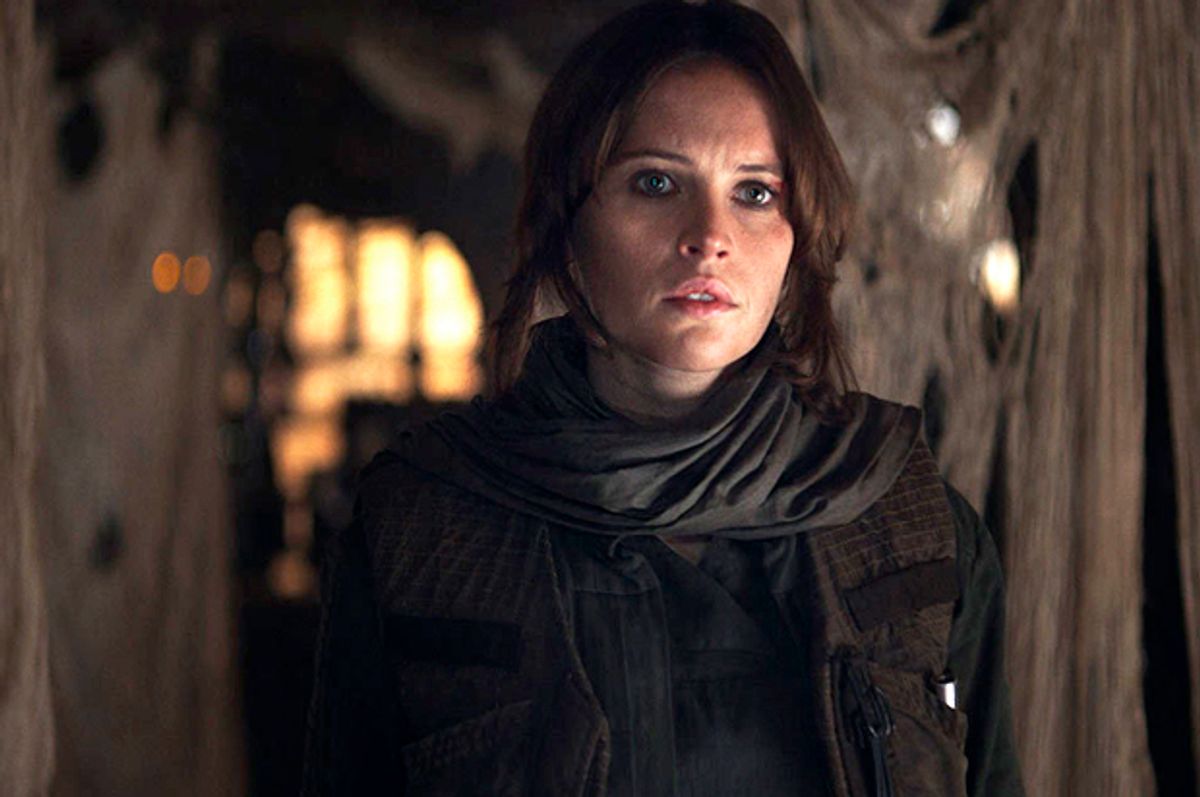It's hard to imagine "Rogue One," the latest installment of the "Star Wars" franchise, coming out in any other year. The film is shockingly bleak for a blockbuster movie funded by Disney and slated for a December release, with a clear eye towards being family-friendly fare for the holiday season.
(Hey, massive spoilers follow from here on out.)
In fact, the director, Gareth Edwards, confirmed this week that the original ending was supposed to be much different. The original ending had some of the main characters surviving, but through a twist that is far more unpredictable than the plot of your typical blockbuster, Disney allowed Edwards and his team to undertake rewrites that led to the ending that audiences are seeing, in which all the main characters die.
While there's a small grace note at the end to leave audiences with let's just say, "a new hope"— our heroes get the plans to the Death Star to Princess Leia, who will use those plans to destroy it — the moment is slight. The emotional wallop of the movie comes from watching all these interesting characters rush toward danger, knowing full well that they aren't going to make it. Their victory is undercut by the fact that no one survives to enjoy it.
To make the whole thing sadder, anyone who knows the rest of the series knows that these characters, since they were invented specifically for this prequel, are never mentioned again in the entire "Star Wars" saga. We never get a scene where Princess Leia speaks of their sacrifice. Whether by design or accident, the message is that these people were both critical and forgotten. They don't get medals or celebrations. They don't become famous heroes like Luke Skywalker. Even the name of the movie, "Rogue One," underlines their anonymity.
It is a perfect movie, in its own way, to take us through the transition from the era of Barack Obama to the era of Donald Trump.
Obama's eight years as presidency had more of a traditional Hollywood blockbuster feeling, at least at the outset. Obama campaigned on hope in 2008 and it helped turn out a large and diverse electorate, excited at the idea that this charming man who could be the hero of a feel-good movie would give us our happy ending. He spent the next years cultivating that image. There were setbacks (that is, everything the Republicans did). But through it all, he radiated hope and racked up some impressive victories — passing universal health care legislation, killing Osama bin Laden, getting the federal bureaucracy largely working as it should again — that justified his heroic image.
Those days are over. With Trump entering the Oval Office, hope is dead. Or worse, right now hope looks foolish. People who give into hope start chasing impossible dreams — the Electoral College will stop him! he'll be impeached on the emoluments clause! — that suggest that they are in deep denial and unable to face reality.
Right now, hope isn't doing it for us. We are not Luke Skywalker, heading to the Death Star with the hope that we're coming out of this alive. There isn't a Hail Mary pass we can throw to save us all. The only question now is how bad things are going to be, with the horror show that was the George W. Bush presidency being somewhere close to the best of all possible outcomes. Our future looks bleak. There's no way around it.
Life isn't a Hollywood blockbuster, with a happy ending waiting for those of us who just work hard enough and apply enough pluck. But that's why "Rogue One" came at exactly the right time. Jyn (Felicity Jones) and Cassian (Diego Luna) and their crew of hardened fighters don't fight because they have hope. They certainly aren't fighting for the glory. They fight because they just really hate the Empire. And if they're going down, they would prefer to go down swinging.
"Rogue One's" plot, whether by design or accident, owes a lot to Quentin Tarantino's 2009 World War II pastiche, "Inglourious Basterds." As in that movie, "Rogue One" opens with a tense scene involving the main villain killing a young woman's family, while she flees in terror. And just as in "Basterds," that young woman chooses to use the life she snatched from the jaws of death to seek revenge on her family's attackers. She does it backed by members of a ragtag team who know perfectly well they are likely to die and be forgotten but gave up caring about that a long time ago.
"Inglourious Basterds" was Tarantino's attempt, in his own messed-up but surprisingly effective fashion, to pay tribute to the many thousands or even millions of people who put their bodies and lives on the line to fight fascism, with virtually no hope of any personal benefit. Messing with the bad guys' plans and making life more difficult for them had to be their only reward because they weren't getting anything else out of it — and weren't likely to find out what would happen later.
A similarly dark point is made in "Rogue One." The characters give up their lives for painfully small victories. One sacrifices himself to pull a handle. Another dies to buy the good guys just a small amount of time. Even the larger mission the movie is built around — stealing the architectural plans for a weapon — feels small compared to the scale of the violence that results from it.
It's a silly Hollywood blockbuster but, man, by sheer accident it landed at the right time. Hope is a rare commodity these days, and people who express hope increasingly sound like fools.
But vowing to fight because you refuse to let the bastards grind you down? That's something we can work with in the age of Trump.



Shares